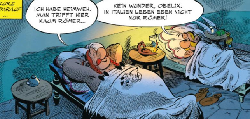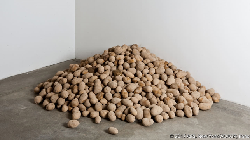October 2017 Culture and Society
Read the articles selected in October 2017
La nuit rouge
by Laurent Joffrin
Source: Libération, 21 October
The October Revolution, whose centenary is celebrated in these days, shows how even utopias can be the place for nightmares. The great narration of a liberator revolution has become the history of a dictatorship which has changed the face of the world.
See attached
En Russie, l’impossible mémoire
by Veronika Dorman
Source: Libération, 21 October

Twenty-five years after the end of the communist regime, Russia is on contradictory, not settled terms with the revolution yet, repeatedly mise en scène and falsified. If now the revolution is a taboo in its great mother country, we all have still to learn from history in reconciliation.
See attached
Au Louvre, une autre Renaissance révélée
by Éric Biétry-Rivierr
Source: Le Figaro, 25 October
The Louvre is hosting an exposition dedicated to a group of Nordic artists, less known but of great talent, revealing the Renaissance splendor of François I kingdom through the simplicity and naturalness of the portraits of the royal family, which form the most important corpus of tables on French history from XVI century.
See attached
“The Square”, la palme d’or qui bouscule le petit monde de l’art contemporain
by Eric Neuhoff
Source: Le Figaro, 18 October

Choosing as bullseye the conceptual art as explained by a museum curator, Ruben Östlund attacks the righteousness of contemporary art and our civilization, without sparing the good intentions and our clear conscience, with a pessimism turning out to be liberatory.
See attached
“Global Times”, un porte-parole décomplexé
by Brice Pedroletti & Harold Thibault
Source: Le Monde, 15 October
Twenty years after Tiananmen, the new generations most educated and well-off in the Chinese society feel represented in the opinions of the Global Times, a party organ also published in English which intends to be a window opened to the Western.
Bernard Shaw
by Fintan O’Toole
Source: The Guardian, 18 October
It’s always licit to ask ourselves why the poor are poor, but today the increasing socio-economic gaps make this question very much topical. The works by Bernard Shaw showed that poverty is not an issue of laziness or immorality, but a social problem.
“Blade Runner 2049” is a flawed replicant
Source: The Economist, 6 October

The sequel to the original Blade Runner replicates the grey tone of the landscapes, characters and the whole post-apocalyptic galaxy, the same fogginess with existential vibrations, but all this atmosphere lacks an engaging narrative thread.
Warum Band 37 der bisher beste “Asterix” des neuen Duos ist
by Marc Reichwein
Source: https://www.welt.de/ ,19 October

In “Asterix and the Race through Italy” the Gallic couple crosses the peninsula in a race against Romans, Italics, and Barbarians, discovering a landscape where different people and idioms live together that already belong to Europe.
Read more:
Die Eröffnung: Europa, das Universum und der ganze Rest
by Andrea Diener
Source: http://www.faz.net/, 10 October

Books cross nations and have made Europe. Nothing strengthens the European project like a cultural exchange or chatting about the freedom of opinion. Books bring peace, market economy and constitutional democracy.
Read more:
Der Raum, das Licht, die Farbe, die Formen
by Bettina Wohlfahrt
Source: http://www.faz.net/, 4 October

Thousands of visitors are filling up the Gallery Karsten Greve in Paris for an exposition of 50 works by Giorgio Morandi, the Bolognese artist who concentrates in his still-life paintings centuries of research on the art space as a construction of light, colors, and forms, enclosing the whole world in his atelier.
Read more:
Luchino Visconti, chercheur du temps perdu
by Mathieu Macheret
Source: Le Monde, 11 October

A retrospective on Luchino Visconti by the Cinémathèque française does justice to the sense for the history which was a peculiarity of this great regisseur of the tragic, represented from Garibaldian Risorgimento to the industrial transformation like a tension between the old and the new world in a changing country.
La féminisation de la médecine en pleine santé
by Éric Favereau & Édouard Caupeil
Source: Libération, 11 October

Once relegated to the generalist or labour medicine, women are numerous today among the hospital doctors. Although some positions are still a male reservoir, their presence under the 45 years old is more and more critical, and their growth is parallel with the increasing rights of the patients.
He approaches the language as a connoisseur, a collector
Source: The Independent, 6 October

The writer Ishiguro has been praised for his work speaking a metaphysical skepticism in respect to the British empirical stance through a minimalist writing and a language he handles as a connoisseur, and whose precision and care turn out in depicting the indeterminacy and the illusion of the world.
Les musées se réinventent plus intimes et vivants
by Christophe Averty
Source: Le Monde, 29 September

At the end of the classifications and hierarchies between the fields of knowledge and the art forms, at the time of the digital revolution, museums reinvent themselves as a concrete space, not cut out from the outside and inclusive, where body materiality and temporality are re-experienced when looking at a work.
Quand les enfants écrivaient à Einstein
by Pierre Barthélémy
Source: Le Monde, 4 October
Cher professeur Einstein by Alice Calaprice is a collection of the correspondence exchanged by the father of the relativity theory with his young fans from all over the world, revealing some fresh aspects of his figure as a scientist.
“The Florida Project” is a subtle film about poverty in America
Source: The Economist, 13 September

The Florida Project” tells those fringes of the American society that can’t be politically uttered. From the point of view of a child, this world where they all strain to pay their weekly rent is magic but real, and observed with a naturalistic style.
Read more:
https://www.economist.com/blogs/prospero/2017/09/trying-get
Arte Povera’s radical simplicity
Source: The Economist, 3 October

The “Arte Povera” celebrates its 50th anniversary. Born as an artistic movement, so-called by Germano Celant who exported it on the international scene, it has been the Italian classical form of the fusion between art and life in a time of economic miracle and political unrest.
Read more:
https://www.economist.com/blogs/prospero/2017/10/post-war-art
Les utopies naissent dans les livres
by Simon Blin
Source: Libération, 25 September

The most important transformations of societies come from a few of books. The capacity to imagine a different future and to elaborate a project alternative to the dominant socioeconomic model changes the course of history, and when the ideal becomes a reality, it belongs to everybody.
Europe’s academies ask: are we in a “post-truth” world?
by David Matthews
Source: Times Higher Education, 9 September
Europe’s academies are worried about “the loss of trust in science and evidence” and questions whether the shift to digital literacy and to consuming information online can undermine and influence how solid knowledge should be acquired.
Directive of the European Parliament and of the Council on copyright in the Digital Single Market
Source: http://eur-lex.europa.eu/
The Eu copyright framework intends to adapt to the way Internet has changed consumers’ access to knowledge, ensuring researchers a more transparent legal space where they can use research tools. A fair and sustainable remuneration of the right aims at protecting the development of European creativity.
Yuval Noah Harari explore notre avenir
by Davis Larousserie
Source: Le Monde, 23 September
A book written by a military historian outlines the socio-political consequences of the advancements in biotechnologies, in the artificial intelligence and data analysis. The augmentation of the psychophysical abilities of the human being and his reduction to a “biochemical algorithm” sketch apparently catastrophic scenarios.
Info
-
Pubblicato il :
19/12/2017
Modificato il : 04/04/2019
Allegati
- "The Square" pdf
- Une autre Renaissance pdf
- L'impossible mémoire pdf
- La nuit rouge pdf
- Blade Runner 2049 pdf
- Bernard Shaw pdf
- Global Times pdf
- La féminisation de la médecine pdf
- Chercheur du temps perdu pdf
- Cher professeur pdf
- Musées vivants pdf
- Ishiguro pdf
- Notre avenir pdf
- Eu directive on the copyright pdf
- A post_ truth world pdf
- Les utopies naissent dans les livres pdf

